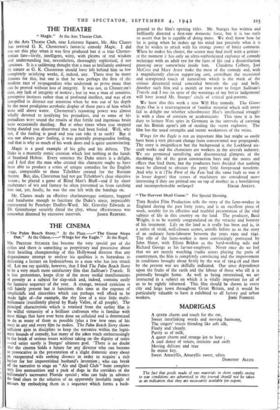THE CINEMA
" The Palm Beach Story." At the Plaza.—" The Goose Steps Out." At the Odeon.—" Wings for the Eagle." At the Regal.
MR. PRESTON STURGES has become the very special pet of the critics and there is something so proprietary and possessive about their bristling championship of this Hollywood director that any dispassionate attempt to analyse his qualities is as hazardous as delivering a lecture on hydrocarbons to a man who has just struck oil. Let me say quickly, however, that I find The Palm Beach Story to be a very much more satisfactory film that Sullivan's Travels. It is less pretentious, keeps clog of the more sordid manifestations of poverty as a subject for slap-stick and, indeed, contains easily the funniest sequence of the year. A strange, twisted cynicism is still faintly present but it functions this time at the expense of simplicitits and sincerities which can perhaps well afford to be made light of—for example, the shy love of a nice little multi- millionaire (excellently played by Rudy Vallee, of all people). The principal characteristic which is retained' from the earlier film is the wilful virtuosity of a brilliant craftsman who is familiar with most things that have ever been done on celluloid and is determined to do as many of them as possible (plus a few new ones of his own) in any and every film he makes. The Palm Beach Story shows sufficient gain in discipline to keep the narrative within the legiti- mate bounds of comedy, but many of the jokes reach embarrassingly to the brink of serious issues without taking on the dignity of satire —and satire surely is Sturges' ultimate goal. 'There is no doubt that the cinema holds a future for any director who can become so provocative in the presentation of a slight domestic story about an exasperated wife seeking divorce in order to acquire a rich backer for her impoverished husband's invention ; who can break off the narrative to stage an " Ale and Quail Club " hunt complete with live ammunition and a pack of dogs in the corridors of the Millionaire's sacrosanct Florida special ; who can hide in advance the final clues to the solution of an apparently insoluble tangle of unours by embodying than in a sequence which forms a back- ground to the film's opening titles. Mr. Sturges has written and brilliantly directed a first-rate domestic farce, but it is too early to assert that he is capable of doing more. We shall know how far he is going when he makes up his mind just precisely what it is that he wishes to attack with his strange power of bitter comment. When he makes his choice, the screen may find itself with a genius: at the moment it has only an ultra-sophisticated exploiter of comedy technique with an adult eye for the facts of life and a dissatisfaction gnawing away somewhere inside him. Claudette Colbert, Joel McCrea and Mary Astor make the most of the comedy and, with a magnificently chosen supporting cast, contribute the occasional and unexpected touch of naturalism which is the mark of the serious directorial mind concealed beneath the cap and bells. Another such film and a month or two more to forget Sullivan's Travels and I too (in spite of the warnings of my better judgement) will have joined Mr. Sturges' circle of critical god-parents.
We have also this week a new Will Hay comedy. The Goose Steps Out is a rearrangement of familiar material which will never fail to delight me whether schoolmaster Hay's intellectual struggle is with a class of convicts or academicians. This time it is his duty to lecture Nazi spies in Germany in the intervals of carrying out his British agent's job of stealing the secret explosive. The film has the usual strengths and recent weaknesses of the series.
Wings for the Eagle is not an important film but might so easily have been a very pleasant change from conventional war propaganda. The story is insignificant but the background is the Lockheed air- craft works and the characters are workers in the aircraft industry. We are permitted tantalising and disconnected glimpses of the throbbing life of the great construction bays and the stores and offices that feed them, but the producers have decided that nothing must be allowed to obscure the petty little foreground novelette. And why is it (The First of the Few had the same fault to mar it in lesser degree) 'that scenes of machinery are considered more interesting if they are printed one on lop of another in a bewildering


























 Previous page
Previous page